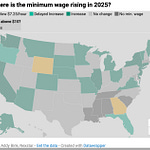Although this post goes out to both free and paid subscribers, if you are not already a paid subscriber, why not take the opportunity to upgrade to paid, right here and now. Thanks!
“Private health insurance companies paid by Medicaid denied millions of requests for care for low-income Americans with little oversight from federal and state authorities, according to a new report by U.S. investigators…” 1 The NewYork Times, July 19, 2023
Generally, I am against what is broadly called “privatization”:
Privatization is the transfer of decision making authority, delivery, or financing from a public to a private entity.21 Such shifts may occur by directly contracting out services to the private sector or may result indirectly from other arrangements, including partnerships with private sector entities and introducing competitive forces into government services.22–24 Regardless of whether the private partner is nonprofit or for-profit, the consistent feature is that control of service delivery may shift to the private sector. The National Library of Medicine
There is an underlying concept that is not born out by evidence produced by economists and other researchers—that the private sector is somehow more efficient, both in “getting the job done” and minimizing the cost of doing so. There are often significant kinks (red tape), in government delivering services to its citizens, but it doesn’t compare to the cost savings measures that private companies will employ to make a larger profit. And this includes denying sometimes medically necessary health care to our most vulnerable citizens—those poor enough to qualify for Medicaid or those old and poor enough to qualify for a combined Medicare/Medicaid plan.
What is most appalling about this scenario is that private health insurance companies, like Aetna, Elevance Health, Molina Healthcare and UnitedHealthcare (which are specifically named in the NY Times article 2 for particularly high denial rates for medical services), deny medical care to those on Medicaid at higher rates than those who are on only Medicare.
While the current report did not look at whether the Medicaid denials were valid, the investigators emphasized the insurers were much more aggressive in refusing to authorize care under Medicaid than under Medicare, the federal program for the elderly and disabled.
In other words, for-profit health insurance companies appear to be picking on the poorest citizens to make a profit. Do these companies think there is less of a chance people with low incomes will challenge their decisions? Maybe the poor are less savvy about their appeal rights3 or maybe just not as smart as those who earn enough to keep above the poverty line.
Although there are several factors that contributed to the trend toward privatization of government services, President Reagan’s early 1980’s mantra against “big government” accelerated the push as a way to cut government spending.
Privatization was a central piece of the Reagan administration’s efforts to reduce the size of government and balance the budget. Harvard Business Review, 1991
“Government is not a solution to our problem; government is the problem.”
Well, I beg to differ, and so do an increasing number of scholars, scientists and elected officials. During the pandemic, with the influx of government programs and money to implement them, including the American Rescue Plan Act, passed in March 2021, which pumped $1.9 trillion into the economy, those studying public policy and a majority of the American people saw the immediate benefits of direct financial aid from the federal government.
The trend of direct government investment to improve the lives of its citizens (others call it “big government”, “deficit or wasteful spending” or even, laughably, “communism and/or socialism”), continued with the passage of the 2022 “Inflation Reduction Act” which directed an additional $1.2 trillion over ten years in investment in renewable energy, including tax credits, stepped up IRS enforcement and upgraded infrastructure among other needed programs. The Inflation Reduction Act has an expected return of $739 billion from increased taxes and other revenue-generating measures.
Currently in the United States, Medicaid Covers approximately 87 million people: — Chart courtesy of Kaiser Family Foundation, June, 2023 —
Yet in a KFF 2023 survey, nearly sixty percent of insured adults questioned, reported problems with their health insurance plans, including unexpected costs and denial of coverage. As a result, many insured adults went without medical care. And most importantly, fifteen percent reported a decline in their overall health.
Private insurers which contract with state Medicare and Medicaid to provide health insurance are subject to both their contractual agreements with the state, and federal regulations, but it appears there should be more direct oversight of compliance. I can tell you from first-hand experience, at least some private health insurers simply do not comply with the requirements of their state contracts and/or federal and state law. And as to efficiency and cost savings, private, for-profit health insurance companies do not contract with the state for free—collectively, they are paid billions of taxpayer dollars to stand between government funded medical care and you, and to make additional profit by cutting costs, which is accomplished in part, by denying medical coverage.
Although this view is increasingly questioned, it seems that many federal and state elected officials buy into the idea that a little-regulated “free market” driven by for-profit companies, even for the delivery of government subsidized health care, is the way to keep government “lean and mean”. This profit motive should have no part in the delivery of government subsidized health care, which is considered a right in every other industrialized, wealthy country on earth. So why is this method our accepted public policy?
The takeaways from our rush toward privatization are more questions than answers:
— Is privatization in fact more efficient and less costly and does the profit-motive actually hurt the delivery of quality government services to the most people?
— Does privatization of essential government services erode the public trust and the very notion of our government working to serve its citizens and the “common good”?
____________________________________________________________________________
I’ll let you answer these questions and any others you feel like discussing. Have any of you on Medicaid, Medicare or private insurance had to fight with your insurance company over costs or coverage? I’d love to hear your thoughts in the Comment Section below:
If you are not already a subscriber, why not take this opportunity to join our community with a free or paid subscription? A new paid subscription or an upgrade from a free to paid subscription will allow me to expand this newsletter with additional, primary source information, like interviews and public information requests, and expanded podcast offerings to include real, live guests. Although I won’t be going on strike any time soon, the current TV writer’s strike demonstrates that writer’s deserve to be paid, and paid well for their work, just like any other profession. Thank you in advance for your financial support of my writing!
Report by the Inspector General’s office of the U.S. Department of Health and Human Services: https://oig.hhs.gov/oei/reports/OEI-09-19-00350.pdf
The author of this New York Times article, Reed Abelson, “currently covers the business of health care, focusing on health insurance and how financial incentives affect the delivery of medical care.” If you are interested in these topics, you can follow her work at nytimes.com
A shocking statistic from a new Kaiser Family Foundation (KFF) survey published June 15, 2023: https://www.kff.org/private-insurance/poll-finding/kff-survey-of-consumer-experiences-with-health-insurance/ and reported in a NYTimes article of the same date.















Share this post